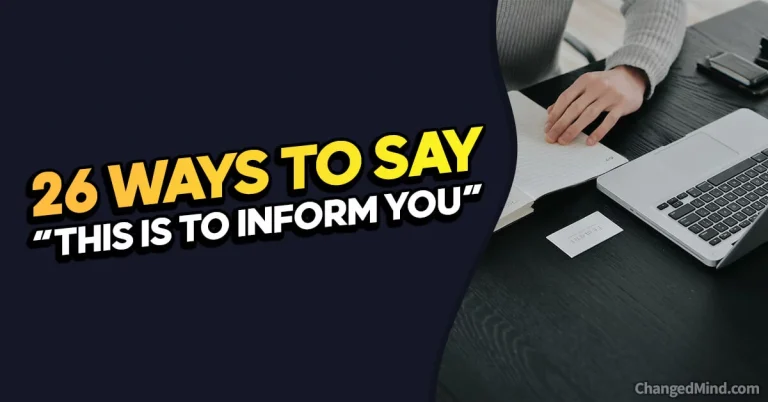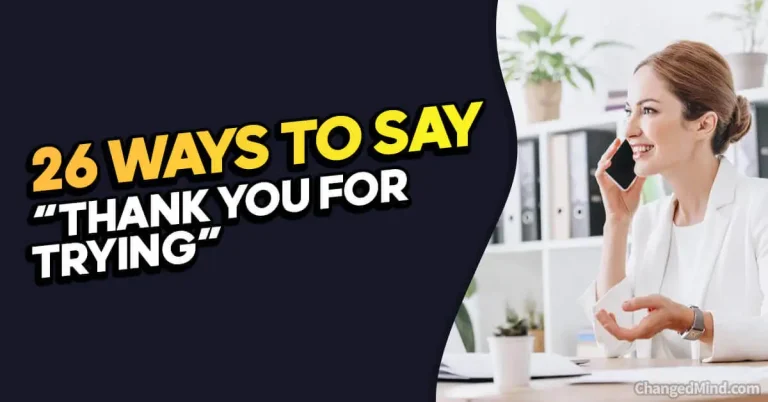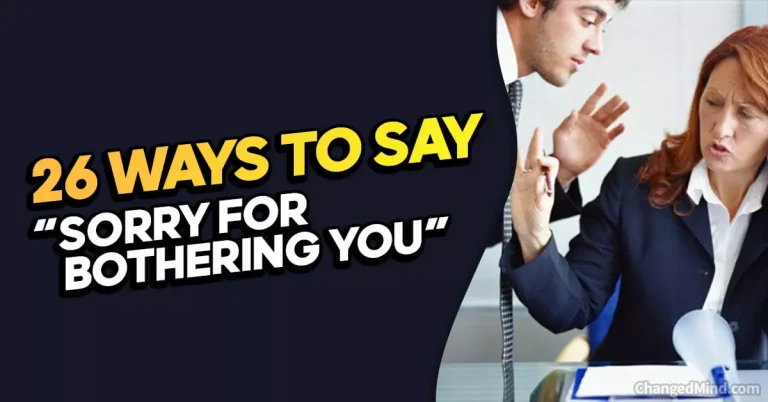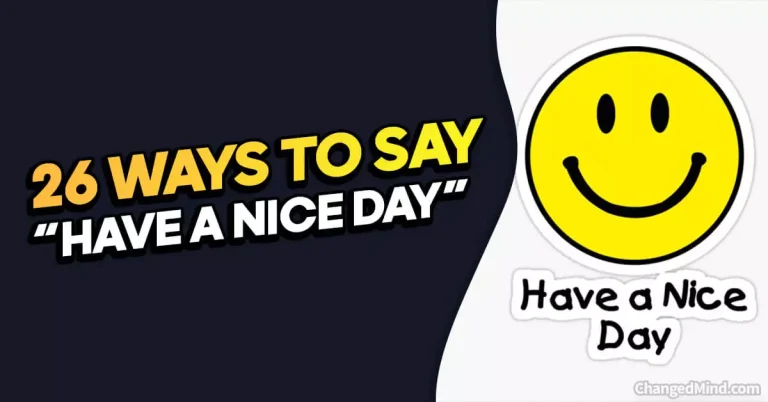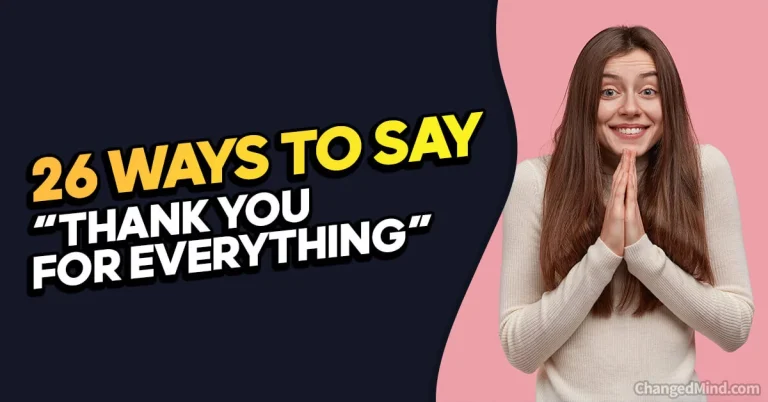Fret no more over those dreaded “I’ll let you know” texts! We’ve got you covered with 26 clever, funny, and oh-so-relatable responses that will leave your friends chuckling and their “let you know” excuse obliterated.
Hey there, ever been left hanging by a text that says, “I’ll let you know”? It’s like waiting for a sequel to your favorite movie, only to find out it’s still in pre-production – the agony! But fear not, fellow texters, because we’ve assembled a treasure trove of witty retorts that will have you taking back control of the conversation in no time.
From cheeky comebacks to hilarious anecdotes, we’ll show you how to handle the dreaded “I’ll let you know” text like a champ. Buckle up, because it’s time to unleash the power of your keyboard and bid farewell to ambiguity!
Key Points:
- The frustration of receiving an “I’ll let you know” text.
- Injecting humor and wit into your responses.
- Nudging the conversation forward with playfulness.
- Anecdotes and examples for inspiration.
- Building stronger connections through clever texting.
The phrase “I’ll let you know” is a common response to various situations, particularly in text messages. However, it can often leave the recipient uncertain about the intended meaning or outcome. Understanding the reasons behind this response and how to effectively respond to it can greatly improve communication. Here is an exploration of the topic:
Why Do People Say “I’ll Let You Know”?
Common Interpretations of “I’ll Let You Know” Texts:
- Indifference or Lack of Interest
- Genuine Intention to Keep You Updated
- Ambiguity or Uncertain Decision
- Politeness and Avoidance of Conflict
How to Respond to “I’ll Let You Know” Texts?
- Request for a Specific Timeframe
- Suggest Another Communication Channel
- Express Understanding and Patience
- Seek Clarification or Ask Follow-up Questions
Effective Communication Tips for “I’ll Let You Know” Situations:
- Be Clear and Direct with Your Intentions
- Set Expectations and Communicate Timelines
- Respond with Empathy and Understanding
- Maintain Open and Honest Communication
Being aware of these interpretations and knowing how to respond can help navigate through the uncertainty often associated with “I’ll let you know” texts. By utilizing effective communication strategies, you can foster better understanding, promote timely decision-making, and strengthen relationships in various interpersonal situations.

Key takeaway:
- Responses of “I’ll Let You Know” texts can have various interpretations:
- 1. It may indicate indifference or lack of interest.
- 2. It might signify a genuine intention to keep you updated.
- 3. It could be seen as ambiguity or an uncertain decision.
- 4. It may be used for politeness and avoidance of conflict.
- When receiving “I’ll Let You Know” texts, you can respond effectively by:
- 1. Requesting a specific timeframe for the response.
- 2. Suggesting another communication channel for further discussion.
- 3. Expressing understanding and patience towards the situation.
- 4. Seeking clarification or asking follow-up questions.
- To navigate “I’ll Let You Know” situations, effective communication tips include:
- 1. Being clear and direct with your intentions.
- 2. Setting expectations and communicating timelines.
- 3. Responding with empathy and understanding towards the other person.
- 4. Maintaining open and honest communication throughout the process.
Why Do People Say “I’ll Let You Know”?
People often say “I’ll let you know” to postpone giving a definitive answer or buy more time before making a decision. This phrase allows individuals to maintain flexibility and avoid feeling pressured into making a decision on the spot.
One reason why people use this phrase is to avoid disappointing others. They may be uncertain about their availability or preferences and want to avoid making promises they can’t keep. By saying “I’ll let you know,” they leave room for further consideration or discussion before committing to a particular course of action.
Another reason is the fear of confrontation or conflict. Saying “I’ll let you know” can postpone a potentially difficult conversation or avoid saying no directly. It provides a buffer zone to avoid hurting someone’s feelings or dealing with disagreement.
Furthermore, saying “I’ll let you know” can also be a strategy to maintain control over one’s schedule or commitments. By not immediately committing, individuals can weigh their options, assess priorities, or seek advice from others before making a final decision.
So, when someone replies with “I’ll let you know,” be understanding and patient. They may need time to think things through or gather more information before giving a definite answer.
26 Best Responses to “I’ll Let You Know” Text
- “No rush, take your time. I’ve already started practicing my patience skills!”
- “In the meantime, I’ll be here like a suspenseful cliffhanger waiting to be resolved!”
- “Ah, the classic ‘I’ll let you know’ text – an enigma wrapped in a mystery!”
- “Plot twist: You’ll actually let me know this time!”
- “Just a heads up, my ‘waiting mode’ comes with built-in snacks and comfy blankets!”
- “No pressure, but the curiosity is slowly turning me into a detective!”
- “Alright, I’ll prepare my drumroll for the big reveal!”
- “Fun fact: Anticipation makes chocolate taste even better! So I’m stocking up.”
- “If ‘let you know’ were an Olympic sport, you’d be the gold medalist!”
- “You’re really mastering the art of keeping secrets, and I’m here for it!”
- “I’ll mark my calendar for the day of enlightenment!”
- “In the meantime, I’ll practice my telepathy skills to predict your response!”
- “I’m like a kid on Christmas Eve, waiting for that ‘let you know’ present!”
- “Reminder: Patience is a virtue, and I’m practically a saint now!”
- “Consider this text your friendly reminder that I’m still waiting… patiently, of course!”
- “No rush, but if waiting were an Olympic sport, I’d be a gold medalist by now!”
- “I trust your ‘let you know’ will be worth the anticipation!”
- “I wonder if the suspense of your response could power a thrilling TV show!”
- “Time to grab some popcorn and watch the drama unfold – I’m eagerly waiting!”
- “I’ll be here, twiddling my thumbs, but don’t worry, I’m a pro thumb-twiddler!”
- “They say good things come to those who wait. I’ll be the living proof!”
- “Just a gentle reminder that the clock is ticking, but I’m still all smiles!”
- “A superhero’s got nothing on me – I’ve mastered the art of patience!”
- “Ah, the sweet serenade of suspense, and I’m the enthusiastic audience!”
- “In the meantime, I’ll be practicing my ‘waiting for greatness’ dance moves!”
- “I’ve taken up yoga to perfect the art of patience while waiting for your response!”
There you go, 26 playful and witty responses to tackle those “I’ll let you know” texts with a smile! Now you’ll never be at a loss for words when faced with this mysterious message. Have fun, and remember, the key is to keep things light and humorous!
Common Interpretations of “I’ll Let You Know” Texts
Curious about what someone really means when they reply with “I’ll let you know“? In this section, we’ll dive into the common interpretations of this text message, ranging from indifference or lack of interest to genuine intentions to keep you updated.
We’ll also explore the possibility of ambiguity or uncertain decisions behind this response, as well as the role of politeness and avoidance of conflict. Get ready to uncover the various meanings behind this seemingly simple phrase.
1. Indifference or Lack of Interest
When someone responds with “I’ll let you know” in a text message, it may indicate indifference or a lack of interest. Here are steps to consider:
1. Reflect on the context: Look back at the previous conversation and assess if there were any signs of disinterest or lack of engagement. Understanding the context can help you interpret their response better.
2. Manage your expectations: Recognize that the person may not be as invested in the topic as you are, and adjust your expectations accordingly. Don’t assume they will provide a prompt or detailed response.
3. Seek clarification: If you genuinely need a response or further information, politely ask for clarification or express the importance of their response. Be direct but understanding in your request.
4. Consider alternative approaches: Explore other communication channels like phone calls or in-person conversations if text messages don’t seem to interest them.
5. Respect their decision: If the person continues to show disinterest or doesn’t offer any further information, respect their decision. Pressuring them may strain the relationship or lead to misunderstandings.
By understanding the possibility of indifference or lack of interest when someone responds with “I’ll let you know,” you can navigate the situation with clarity and effective communication. Remember to respect the other person’s boundaries and be open to alternative approaches for addressing the topic.
2. Genuine Intention to Keep You Updated
When someone says “I’ll let you know,” it can be a genuine intention to keep you updated. Here’s how to respond:
- Clear communication: Maintain clear and open communication. Ask for specific details about when they will provide an update, such as a time or date.
- Regular follow-ups: If they haven’t provided an update within the agreed timeframe, reach out and ask for an update. This shows you value their commitment to keeping you informed.
- Express understanding: Show patience towards their situation. They may have valid reasons for not providing an immediate update.
- Ask for clarification: If you need more information or have further questions, ask for clarification or provide specific follow-up questions.
By following these guidelines, you can ensure effective communication with someone who genuinely intends to keep you updated.
Fact: Clear and regular communication is crucial in professional and personal relationships as it fosters trust and understanding.
Uncertain decisions are like the spin of a roulette wheel, leaving you wondering where exactly your chips will fall.
3. Ambiguity or Uncertain Decision
The specific topic of “Ambiguity or Uncertain Decision” is explored in this article, focusing on the different interpretations of the commonly used phrase “I’ll let you know” in text messages.
When someone uses this phrase, it can have two possible meanings:
- Ambiguity: In this case, the sender might not have a clear decision yet or may be uncertain about how to respond. This could be because of conflicting priorities or a lack of relevant information.
- Uncertain Decision: In this scenario, the sender is still in the process of making a decision and wants to delay giving an answer. They might require more information or want to consult with others before responding.
Understanding the ambiguity or uncertain decision behind the phrase “I’ll let you know” is crucial for managing expectations and communicating effectively. When you come across this response, consider the following tips:
- Request a specific timeframe: Politely ask for an estimate of when you can expect to receive a response. This helps to establish a timeline for further communication.
- Suggest another communication channel: If appropriate and feasible, propose alternative means of communication that may speed up the response or allow for a more detailed discussion.
- Express understanding and patience: Acknowledge the sender’s situation and assure them that you are willing to wait for their decision. Show empathy and patience in your response.
- Seek clarification or ask follow-up questions: If there are specific details or factors that can assist in the decision-making process, politely ask for clarification or provide further information that might help them.
When dealing with ambiguous or uncertain decisions in communication, it is important to:
- Be clear and direct with your intentions: Ensure that your own message is clear and concise, so the other person understands your expectations.
- Set expectations and communicate timelines: If you need a timely response, communicate your expectations regarding when you would like to receive a decision or update.
- Respond with empathy and understanding: Show empathy towards the other person’s situation, recognizing that decision-making can sometimes be complex, and people need time to assess their options.
- Maintain open and honest communication: Encourage a transparent and open dialogue to foster better understanding and trust between both parties.
Pro-tip: Remember that ambiguous or uncertain decisions are common in various situations, and patience, understanding, and effective communication can help navigate these situations more smoothly.
Who needs confrontation when you can just say ‘I’ll let you know‘ and watch the chaos unfold?
4. Politeness and Avoidance of Conflict
When someone sends a text message saying “I’ll let you know,” it can be seen as a polite way to avoid conflict. There are several reasons why people choose to use this phrase:
1. Politeness and Tact: By saying “I’ll let you know,” individuals can tactfully delay their response or decision, thereby avoiding any disappointment or upset.
2. Avoiding Conflict: This phrase helps people steer clear of conflicts by not committing to a definitive answer or decision. It allows them to keep their options open and prevents confrontations.
3. Maintaining Flexibility: When someone says “I’ll let you know,” it gives them the opportunity to buy more time, allowing them to gather information or carefully consider the consequences before providing a definite response.
4. Respecting Boundaries: By using this phrase, individuals establish their need for personal space and boundaries. It indicates that they require time and space to think things through before making a decision.
When responding to someone who says “I’ll let you know,” it’s crucial to approach the situation with empathy. Here are some effective communication tips:
1. Be Patient: Understand that the person may require time to consider their options or gather information. It is essential to be patient and allow them to make the best decision.
2. Express Understanding: Show empathy and acknowledge the challenging nature of certain decisions. By expressing understanding, you create a supportive environment.
3. Seek Clarification: If you need a clearer timeframe or more specific information, kindly ask for it. Encourage open and honest communication to ensure clarity.
4. Maintain Open Communication: It is important to keep the lines of communication open and encourage the person to update or seek additional support throughout the decision-making process.
Remember, incorporating politeness and avoiding conflict can greatly contribute to effective and respectful communication.
How to Respond to “I’ll Let You Know” Texts?
When it comes to receiving the dreaded “I’ll let you know” text, we’ve all been there. But fear not, because in this section, we will explore the best ways to respond to these uncertain messages.
From requesting a specific timeframe to suggesting alternative communication channels, expressing understanding and patience, or seeking clarification with follow-up questions, we’ve got you covered.
Say goodbye to the frustration and uncertainty, as we delve into practical tips for navigating these tricky texts. Let’s dive in and conquer the art of responding to “I’ll let you know” messages!
1. Request for a Specific Timeframe
When someone says “I’ll let you know,” it’s important to politely ask for a specific timeframe. This helps establish clear expectations and ensures timely communication. Here are some ways to make a request for a specific timeframe:
1. Politely ask for a deadline or timeframe: Instead of accepting “I’ll let you know,” you can reply by saying, “Please let me know by [specific date or time]?” This conveys your expectation for a prompt response.
2. Suggest a deadline based on your needs: If you have a specific deadline in mind, express it. For example, you can say, “I would appreciate if you could let me know by [specific date or time] so that I can plan accordingly.”
3. Request a follow-up: If the response lacks a specific timeframe, ask for a follow-up. You can say, “When can I expect to hear back from you?” This prompts the other person to provide a specific timeframe.
4. Seek clarification on the timeframe: If the response is unclear, ask for clarification. You can say, “Could you please clarify when you will provide an update?” This ensures a clear understanding of when to expect a response.
By requesting a specific timeframe, you effectively communicate your needs and expectations while maintaining a professional tone. It allows for better planning and avoids waiting indefinitely for a response.
2. Suggest Another Communication Channel
When faced with an “I’ll let you know” text, it can be helpful to suggest another communication channel. Here are some options to consider:
1. Phone call: Suggest having a phone conversation to discuss the matter further. This allows for real-time communication and the opportunity to ask and answer questions more easily.
2. Meeting in person: If the situation requires a more detailed discussion or involves a sensitive topic, propose meeting face-to-face. This allows for clear communication and the ability to read non-verbal cues.
3. Email: If the matter requires written documentation or if you want to provide more information, recommend continuing the conversation via email. This allows for the exchange of detailed information and provides a written record of the discussion.
4. Video chat: If meeting in person is not possible, suggest a video chat using platforms like Zoom or Skype. This allows for visual engagement and a more personal connection than a phone call.
Each option has its advantages and may be more suitable depending on the nature of the discussion. Consider the preferences and availability of the other person as well.
Story: I once found myself in a situation where a colleague said “I’ll let you know” in response to a proposal I had presented. Sensing the need for more direct communication, I suggested setting up a meeting to discuss the details further. By suggesting another communication channel, in this case, a face-to-face meeting, we were able to have a productive discussion, address concerns, and reach a decision more efficiently than through text-based communication alone. It allowed both of us to express our thoughts clearly and work through any ambiguity, leading to a successful outcome.
3. Express Understanding and Patience
Expressing understanding and patience is crucial when responding to “I’ll let you know” texts. It shows respect for the other person’s decision-making process and helps maintain positive communication. Here’s what to consider:
- Be empathetic: Understand that the person may need time to gather information, consult others, or make a decision. Acknowledge their need for space and respect their timeline.
- Show patience: Avoid pressuring for an immediate response. Give them the time they need without repeatedly asking for updates.
- Stay positive: Use a supportive and understanding tone. Express confidence in their decision-making ability and offer your support.
- Offer assistance: Let them know you’re available to help or provide additional information. Assure them of your willingness to collaborate in finding a resolution or making arrangements.
Expressing understanding and patience can build trust and strengthen relationships. Remember to respect everyone’s decision-making process. By being patient, empathetic, and supportive, you can foster effective communication.
Fun Fact: Expressing understanding and patience not only improves communication but also positively influences mental and emotional well-being. Studies have shown that practicing empathy and patience boosts satisfaction in relationships and contributes to a greater sense of fulfillment.
4. Seek Clarification or Ask Follow-up Questions
When you receive an “I’ll let you know” text, it’s natural to want more information. Here are steps you can take to seek clarification or ask follow-up questions:
1. Begin by expressing your interest and desire for more information. For example, say, “I appreciate your response. Could you please provide some additional details?“
2. Ask specific questions related to the topic. This will help you gather more information and address uncertainties. For instance, ask, “When can I expect to receive an update?” or “What factors are being considered before a decision is made?“
3. Seek clarification on any ambiguous or unclear statements. Ensure you have a clear understanding of what the person means. Ask questions like, “Could you please elaborate?” or “Can you please clarify?“
4. Inquire about different options or possibilities to gain a better understanding of the situation. Ask, “Are there any alternative solutions being considered?” or “What other options are available?“
5. Request specific examples or evidence to support the information provided. This will help validate the information and give you a clearer perspective. Ask, “Can you provide any examples or data?” or “Is there any evidence to support this claim?“
6. Express your willingness to collaborate or assist further. Say, “If I can help or provide additional information, please let me know.“
By taking these steps, you can seek clarification and gather the information you need to move forward in the conversation. Remember to communicate with respect and openness, allowing for a constructive exchange of information.
Effective Communication Tips for “I’ll Let You Know” Situations
Looking to improve your communication skills during those “I’ll let you know” moments? In this section, we’ll explore effective tips that will help you navigate these situations smoothly.
Discover how being clear and direct with your intentions can foster better understanding. Learn how setting expectations and communicating timelines can minimize uncertainty.
Explore the importance of responding with empathy and understanding. Lastly, we’ll discuss the significance of maintaining open and honest communication throughout. Get ready to handle those “I’ll let you know” texts with confidence!
1. Be Clear and Direct with Your Intentions
When it comes to communicating with others, it is crucial to be clear and direct about your intentions. This ensures that the communication is effective and helps to avoid any misunderstandings. To achieve this, follow these steps:
- Clearly state the specific information or decision that you need. Instead of using vague phrases such as “I’ll let you know about the meeting,” be more precise by saying “I’ll inform you about the date and time of the meeting.”
- Provide a timeframe within which you will provide the information or make the decision. For example, you can say, “I’ll let you know by the end of the day” or “You can expect to hear from me within 24 hours.”
- Offer any additional details or criteria that are necessary for making the decision. This ensures that everyone involved is on the same page and working towards the same goal.
- Avoid using language that is vague or ambiguous as it can lead to confusion. Instead, be straightforward and transparent in your communication.
By following these steps, you can foster clear and direct communication, build trust, and ensure that everyone is working towards a common goal. Additionally, here are some suggestions to enhance clear and direct communication:
- If you are unsure about something, always ask for clarification. It is better to seek clarification rather than making assumptions.
- Practice active listening to understand the other person’s perspective and intentions.
- Be open to feedback and willing to adapt your approach if necessary.
- Practice empathy and understanding, recognizing that different people have different communication styles.
By being clear and direct with your intentions, you can minimize misunderstandings and foster effective communication in various situations.
2. Set Expectations and Communicate Timelines
When it comes to handling “I’ll let you know” situations, it is important to set clear expectations and effectively communicate timelines. This will help avoid misunderstandings and ensure effective communication. Here are the steps you can follow to handle such situations:
1. Express your need for clarity and let the other person know that you appreciate a specific timeframe for a response or update.
2. Be assertive and directly ask for a deadline or specific date when you can expect a response. Use clear and assertive language to convey your request.
3. If necessary, suggest alternative communication channels such as a phone call or an in-person conversation. This will help prompt communication.
4. Maintain a respectful tone and express understanding and patience. Emphasize the importance of timely communication while showing understanding.
5. If the response is still vague, ask follow-up questions for clarification. Request specific details or updates to ensure clear understanding.
To effectively communicate in “I’ll let you know” situations, remember the following tips:
1. Clearly and directly express your intentions and expectations. Be clear and specific about your needs.
2. Establish and communicate timelines. Specify when you expect a response or update, while also being realistic about timeframes.
3. Respond with empathy and understanding. Recognize valid reasons for delays and show empathy in your interactions.
4. Maintain open and honest communication. Encourage transparency and keep the lines of communication open.
By following these steps and tips, you will be able to navigate “I’ll let you know” situations effectively and communicate expectations and timelines clearly.
3. Respond with Empathy and Understanding
When responding to “I’ll Let You Know” texts, it is important to approach the situation with empathy and understanding. Here are some steps you can follow to respond effectively:
1. Begin by acknowledging the message and expressing appreciation for their intention to keep you updated. Let them know that you value their effort to provide information.
2. Understand that the person may require more time or information before giving a definitive answer. Let them know that you recognize their need for further clarification or details.
3. Show your willingness to assist them and provide any additional information they may need to make a decision. By demonstrating your support, you can help them feel more confident about their choices.
4. Respect their need for time to gather information or consider their options. Avoid pressuring them for an immediate response, as it is important to give them space to make an informed decision.
5. Express patience and understanding while waiting for their final decision. Let them know that you are willing to wait and that you understand the importance of the matter at hand.
6. If appropriate, offer alternative communication channels or suggest a face-to-face meeting to discuss the matter further. This can help facilitate better understanding and allow for a more thorough exchange of ideas.
7. If a specific timeframe was mentioned or if you haven’t heard back within a reasonable period, politely follow up to check for updates. This shows that you are attentive and committed to resolving the issue.
By responding with empathy and understanding in “I’ll Let You Know” situations, you can maintain positive communication and build stronger relationships. Following these steps will help you navigate these conversations effectively, ensuring that everyone involved feels respected and heard.
4. Maintain Open and Honest Communication
Maintaining open and honest communication is crucial for building trust, resolving conflicts, and fostering strong relationships. Here are some essential tips to maintain open and honest communication:
1. Listen actively: Pay attention, maintain eye contact, and show genuine interest. Avoid interrupting and make sure to understand before responding.
2. Be honest and transparent: Share your thoughts, feelings, and opinions openly. Avoid withholding important information or manipulating the truth.
3. Express empathy and understanding: Show compassion and validate others’ emotions and experiences. Demonstrate that you are willing to listen and support them.
4. Ask for feedback: Encourage open dialogue by seeking feedback and suggestions. Create a safe space for others to express their thoughts and concerns regarding maintaining open and honest communication.
5. Resolve conflicts calmly: Address conflicts promptly and constructively. Practice active problem-solving, seek compromise, and focus on mutual solutions.
6. Avoid assumptions and judgments: Seek clarification and ask questions to understand the situation better when it comes to maintaining open and honest communication.
7. Respect differences: Value diverse perspectives and opinions. Treat others with respect, even if you disagree. Embrace the opportunity to learn and grow in the context of maintaining open and honest communication.
8. Follow through on commitments: Honor your word and fulfill promises. Be reliable and accountable in the context of maintaining open and honest communication.
Maintaining open and honest communication lays the foundation for healthy relationships. By practicing these strategies, you can foster trust, improve collaboration, and create an environment where everyone feels heard and valued.
The invention of the telephone in the early 20th century revolutionized communication. It bridged gaps and brought people closer together. Today, we build on this progress using various channels like video calls, instant messaging, and social media.
Some Facts About “Responses to “I’ll Let You Know” Text”:
- ✅ The phrase “I’ll let you know” can have different meanings depending on the context. (Source: ChangedMind.com)
- ✅ It can mean that the person is unsure and needs more time to think before giving an answer. (Source: ChangedMind.com)
- ✅ “I’ll let you know” can also be a polite way of saying no to a request. (Source: ChangedMind.com)
- ✅ There are 20 possible responses to the phrase, depending on the situation. (Source: ChangedMind.com)
- ✅ Deceit could be involved when someone says “I’ll let you know,” so it is necessary to be cautious and discern the true intention behind the statement. (Source: ChangedMind.com)
Frequently Asked Questions
What does the common text response “I’ll let you know” commonly mean?
The phrase “I’ll let you know” can have different meanings depending on the context. It can mean that the person is unsure and needs more time to think before giving an answer. It can also mean that the person prefers to decide later, and their action of postponing is voluntary. Another meaning is that the person doesn’t know the answer or solution to the question and chooses to postpone explaining later.
How should I respond to someone who says “I’ll let you know”?
There are 20 possible responses to the phrase, depending on the situation. Some responses include: “If you wish to,” “Okay, sure,” “Please do, it’s important,” “I’ll be patiently waiting for that,” “You can take all the time you need,” and “It’s now up to you.” It is important to understand the true meaning behind the phrase before responding to it.
What is the psychology behind saying “I’ll let you know”?
Saying “I’ll let you know” can sometimes be a way of avoiding saying no directly. Many individuals struggle with saying no because they fear upsetting others. However, it is important to set boundaries and learn to say no for one’s own well-being. People who have difficulty saying no are often called “people pleasers” and may experience built-up resentment and frustration from constantly putting others’ needs before their own.
How do people pleasers tend to respond when faced with saying “no”?
When faced with saying “no,” people pleasers tend to overthink their decisions and may feel guilty. They may use phrases like “I’ll let you know” as a way to postpone a direct answer, avoiding conflict or disappointment. This can lead to a mental dilemma for the person who is seeking a clear response.
Is it better to be straightforward or use vague responses like “I’ll let you know” in dating situations?
Opinions vary on whether it is better to be straightforward or use vague responses in dating situations. Some argue that being straightforward and not leading others on is the best approach. However, others believe that using vague responses can be a way of avoiding hurting someone’s feelings. Ultimately, clear and open communication is important in any relationship.
How has the viral tweet about “I’ll let you know” sparked a larger conversation?
A viral tweet about “I’ll let you know” has sparked a conversation about the importance of learning to say no and not giving false hope with a “maybe.” Some Twitter users agreed with the tweet, stating that saying “I’ll let you know” is a way of politely declining someone’s invitation without being direct. Others expressed disappointment with this vague response, arguing that it is better to be straightforward. This tweet has generated a discussion about communication and the need for honesty in our interactions.


